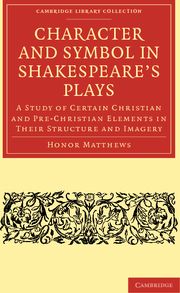 Character and Symbol in Shakespeare's Plays
Character and Symbol in Shakespeare's Plays Book contents
Chapter V - Pardon and Punishment
Published online by Cambridge University Press: 07 September 2010
Summary
King Lear, in which Shakespeare takes up and transcends the various images of justice, mercy and false-seeming which he had previously created, and fuses them into a whole of new and terrible beauty, has two early precursors of considerable interest. Titus Andronicus, offers an unusually vivid example of the long incubation which a thought may undergo in a poet's mind. Titus, like Lear, is an old man driven mad by the loss of his all, yet retaining in madness a clear knowledge of his own wrongs and of their perpetrators. Like Lear he has begun his own undoing by driving from him his child, Mutius, whom he unjustly kills and by trusting in the specious words of his enemies to whom he surrenders the realm of which he could have been chosen emperor. Having given them everything he is driven to madness, finally dying himself and killing the beautiful and virtuous daughter whom he loves.
Lastly, as Lear does, Titus seeks from heaven the justice denied him on earth. In a grotesque but tragic scene he addresses petitions to the gods, sending to Pluto by messenger and dispatching the other petitions by shooting them skyward on arrows. The first message is to Pluto.
Tell him, it is for justice and for aid,
And that it comes from old Andronicus.
IV, III, 15–16Publius brings answer:
Pluto sends you word,
If you will have Revenge from hell, you shall:
Marry, for Justice, she is so employ'd,
He thinks, with Jove in heaven, or somewhere else,
So that perforce you must needs stay a time.
IV, III, 37–41- Type
- Chapter
- Information
- Character and Symbol in Shakespeare's PlaysA Study of Certain Christian and Pre-Christian Elements in Their Structure and Imagery, pp. 139 - 162Publisher: Cambridge University PressPrint publication year: 2009First published in: 1962
